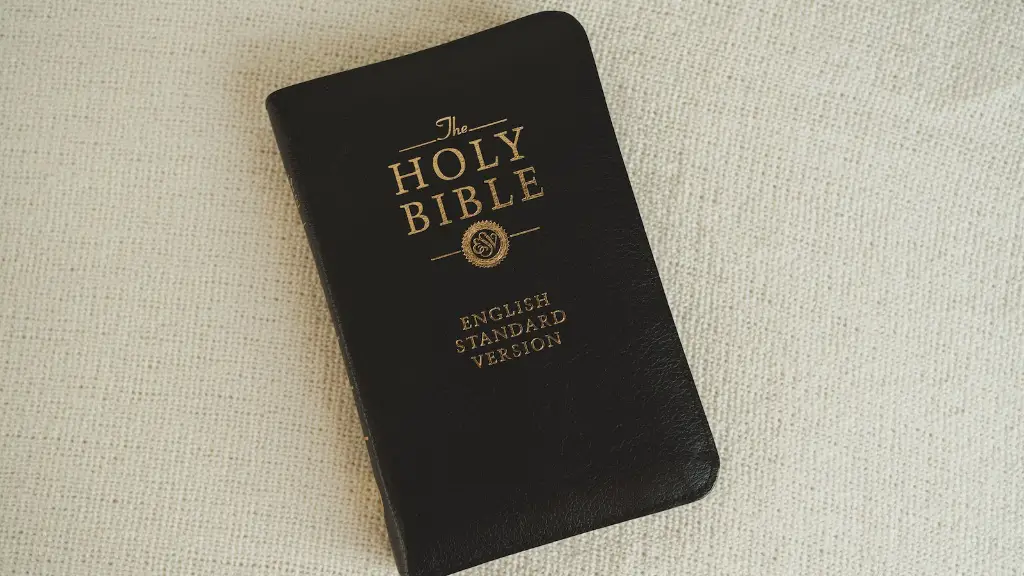Are you curious about the Bible, particularly where to start your reading journey? The Bible is an ancient collection of books and the stories they tell can give us an idea of what life was like in times past. But with so many books and chapters, it can be daunting to know where to start reading. It’s up to you to determine where to dive in, but guidance may be found in different starting points, depending on your interest and what type of reading you are looking for.
The Bible’s structure is divided into two main parts, the Old Testament and the New Testament. The Old Testament contains mostly Hebrew scriptures and documents the history of the world from the creation of the universe up until the birth of Jesus. It is approximately 1,200 years of writings. The New Testament looks at the life and death of Jesus, as well as various letters to congregations or individuals from leaders in the church.
The Old Testament is further divided into four sections: the Pentateuch, History, Poetry, and Prophets. The general storyline in the Pentateuch is from creation to the death of Moses. The History category ranges from the conquest to the return from Exile. The Poetry section is mostly Psalms and Proverbs, while the Prophets section includes the Major and Minor Prophets. The books in each section are ordered by the approximate time of their story progression.
The New Testament begins with the Gospels: Matthew, Mark, Luke, and John. The other books cover letters, revelation, and the lives of the apostles. Each book reveals one aspect of the life of Jesus and his teachings.
For those who simply want to explore the Bible and experience its unique stories, the starting point may be Genesis, the first book of the Old Testament which includes the story of creation. Or, for readers interested in the New Testament teachings, starting with the book of Matthew to trace the journey of Jesus Christ is ideal. Alternatively, for Christian and practitioners, the epistles of James, Paul, and John may be the better starting point, as they contain religious instructions written to the early Christian churches and individual Christians.
If interested in diving deeper into the Bible and understanding it more completely, one could start at the beginning and read cover to cover. It is important to be mindful and look for certain pieces of literature that focus on one book in the Bible, such as commentary and exegesis. This will provide an in-depth look at specific books and can prove to be very useful. The Bible has books for every kind of reader, from beginner to expert, from novice to long-time reader.
Jewish Perspective
Given the perspective of the Jewish Bible’s origin, the best chapters to read first would be those from the Torah, written by Moses. Starting from Genesis, the creation of all life, to the end of the five books in Deuteronomy, the commandments for the people of Israel, is a great introduction to the Bible. These books become the basis of the obligations of the Jews and the stories continue through the other books of the Old Testament.
According to Jewish customs and teachings, the best approach to reading the Bible is to browse through the different books while focusing on key points. Although some may prefer to read each book cover to cover, the most important point is to find the core understanding of each chapter and passage. An even more in-depth look at each book can be attained with the help of Jewish commentaries, which are an insightful read. In many cases, this type of reading will make a more lasting impact.
In the Jewish interpretation of the Bible, as outlined in the Talmud and other Jewish writings, the spiritual insight behind words and stories are much more important than simply understanding the literal meaning. For this reason, a great deal of emphasis is placed on understanding the original Hebrew language and its nuances. Furthermore, the context of a verse – or the culture of the people who wrote the words – can give readers a better understanding of how the Bible was originally understood by its writers.
Christian Perspective
For a Christian reader, the best place to start is either in the Gospel of Matthew or the Gospel of John. Both of these books give a detailed account of the life and teachings of Jesus Christ, as well as his death and resurrection. Reading these books will provide believers with a greater knowledge and understanding of Christ’s mission. There are also other books in the New Testament that give further insight, such as the Acts of the Apostles, and the letters written by Paul and other apostles.
In terms of the Old Testament, some may choose to read the Pentateuch only, while others may elect to read the whole thing. For believers, starting with the five books of Moses is essential, as it reveals key points about the relationship between God and the Covenant with man. Additionally, the Old Testament teaches about God’s character and plan of redemption, which is overlaid throughout the remainder of the Scriptures.
For Christians, understanding a book’s context is also key to unlocking its truth. The Bible is composed of writings from several authors, from different time periods and cultures. So, by studying the history of when and why a book was written, one can gain an even greater understanding of the big picture. Consideration should also be given to content such as prophetic utterances, parables, and legal teachings.
Survey of the Landscape
No matter which faith is held, a good entry point to the Bible is to survey the landscape so to speak. A holistic view of the overarching themes can provide divine insight and is essential to uncovering the grand narrative of the Bible. This survey can be done by reading different books of the Bible in short bursts. Make note of what themes each book entails and the overall idea of each part of the Bible.
In order to understand the Bible, one must spend time engaging with it. Take it slow and thoroughly explore a book before moving onto the next. Pay attention to its structure, flow of story, history, and contexts. While reading, try to ask different questions about the characters or metaphors and draw conclusions about the author’s intentions or how this piece of literature fits within the grand narrative of the Bible.
Also, pay attention to cultural context and parallels or repetition of stories. By seeking to understand the culture and language of the original authors, a reader can obtain insight and enrich their interpretive skills. Additionally, look for themes that keep arising as they can provide parallel stories or historical backgrounds to the text.
Learning Biblical Languages
For those who are eager to deepen their understanding of the Bible, learning the original language can be extremely beneficial. While the New Testament was originally written in Greek and the Old Testament in Hebrew, some also use translations from Latin and ancient Aramaic. Learning the language can provide better interpretation of the Bible, as well as a more complete understanding of the original intent and context of the passages being read.
Through the guidance of expert teachers, the reader can learn the language while studying the scriptures. Online courses, seminars, and books are available to learn the alphabet and grammar of biblical languages. This can provide a more literal understanding of Bible passages, in addition to gaining valuable insight into the manner of speech and writing style.
Learning Hebrew, in particular, can provide an even more enhanced understanding as it has been suggested that certain Hebrew words have deeper meanings and secrets that remain hidden to common English translations. Consonants often have multiple readings, while vowels can be inserted or removed by the reader, depending on context.
Engagement With Modern Commentaries
Engaging with scholarly writings from the Bible is another way to gain insight and fuel greater understanding. Different religions have different commentaries, and for the Christian community, there are commentaries by theologians, famous authors, and modern pastors. While these commentaries are different, reading them can provide a fuller understanding of different stories and contexts, as well as add further insight from the modern perspective.
Commentaries can be helpful when trying to unpack difficult or confusing passages, or to gain additional understanding of an author’s intent. Specialised commentaries are also available for discovering cultural and historical context. For example, looking at the Samaritan Pentateuch – a version of the Torah written in a different script – can help understand authors’ approach to the ancient texts.
Further engagement with modern commentaries can be done through reading blog posts, podcasts and listening to churches’ sermons. All of these can provide great insight into the Bible, and help the reader grow in their understanding of spiritual and religious practice.
Engaging With Communities
Beyond commentaries, the reader can also find wisdom by engaging with their local church or in their theological or academic communities. Community engagement is an important outlet for learning, as it is an opportunity for the individual to share ideas, ask questions and hear others’ perspectives. Groups like these provide fellowship, and in the process, can often help deepen faith and understanding.
Other avenues of study can include devotional books that provide stories and guidance to deeper understanding. Looking into books, such as The Jesus Storybook Bible and The Bible Revealed are two sources that provide additional background for stories, conditions and spiritual concepts associated with the biblical texts.
In short, the Bible is filled with treasures waiting to be discovered. How one decides to delve into the scriptures is completely dependent on the individual, however, the above-discussed steps are a great place to start. The Bible offers something to everyone and while it can be daunting to begin this journey, the readers who persevere will be amply rewarded.





